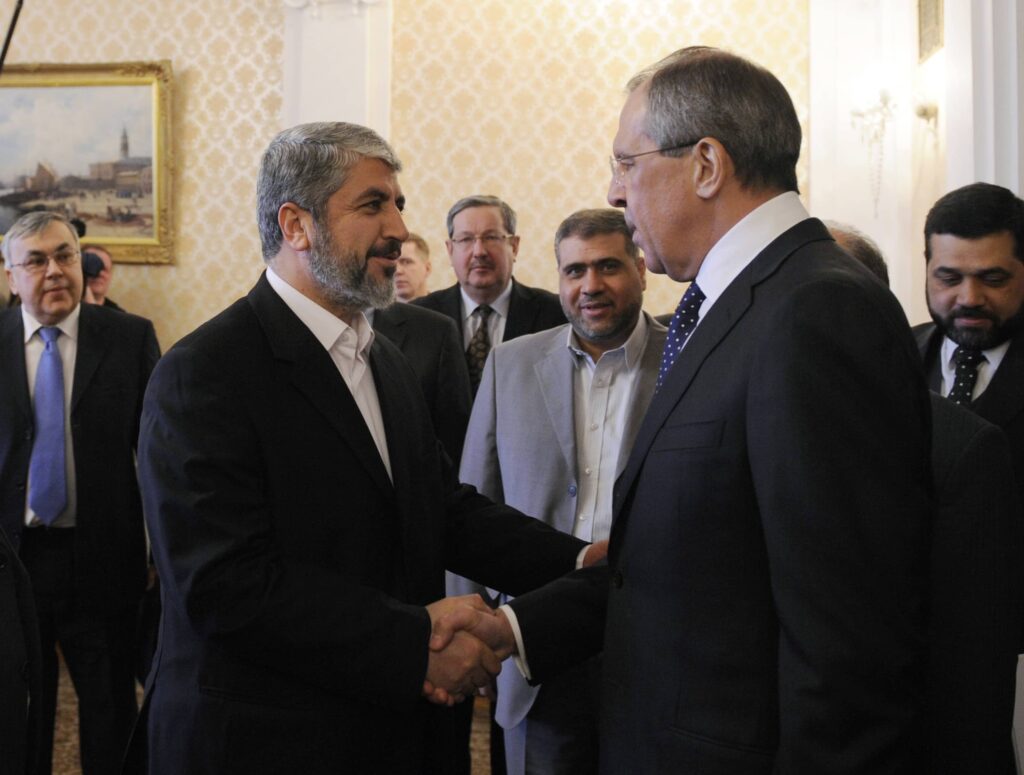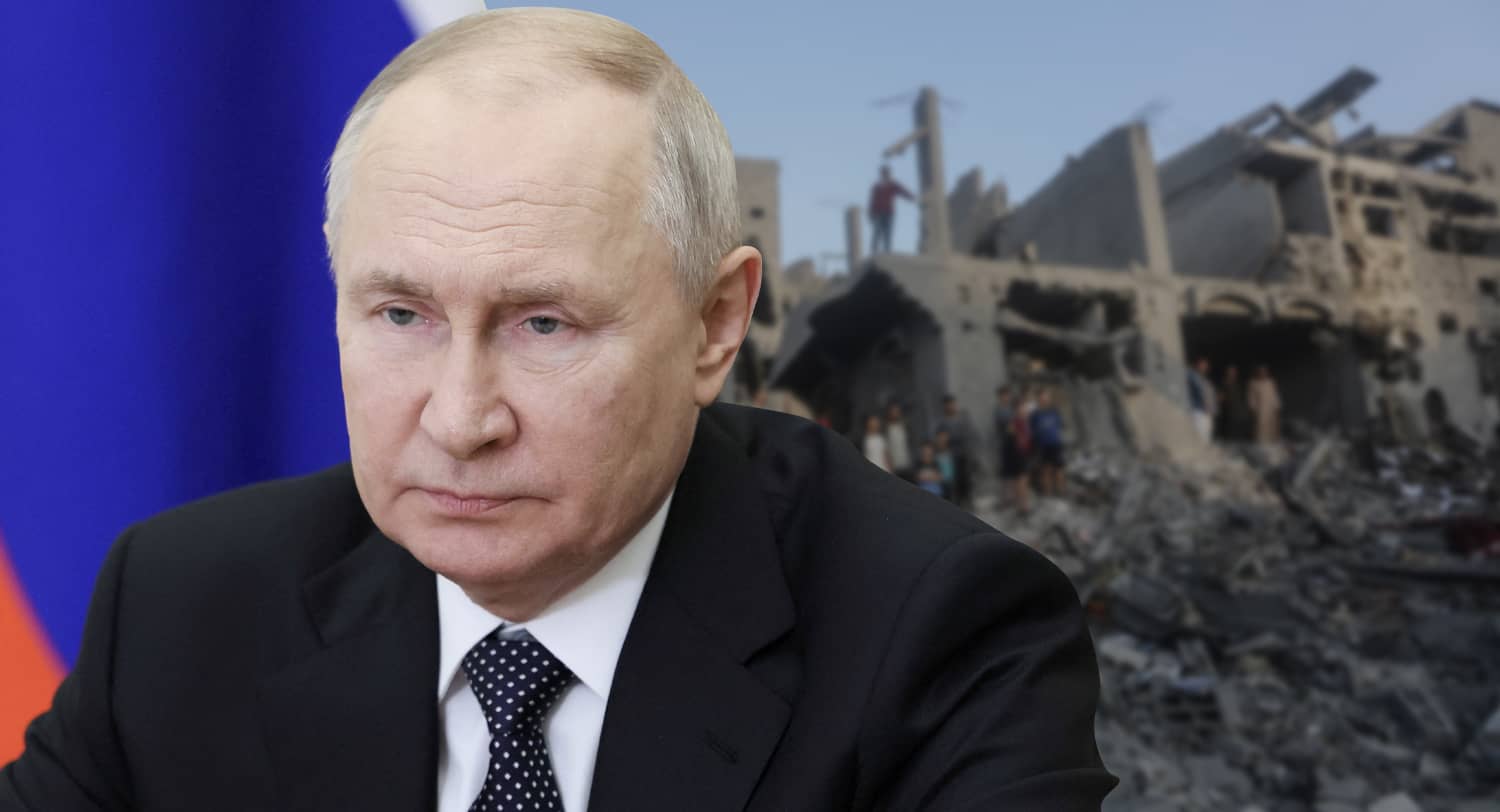Several media outlets have speculated about Moscow’s involvement in Hamas’ most recent aggression against Israel. Certainly, this war may have the effect, whether intended or not, of benefitting Moscow by diverting Western attention and support from Ukraine. But there is some evidence, presented below, of Moscow’s intention to exploit and benefit from the war so as to enhance its standing and influence in the Middle East (and sow chaos among US allies).
There is a further question of whether or not Moscow was actually involved in planning the Hamas attack. Others have raised this possibility. The scale, ambition – which was to reach Israeli cities well beyond the area actually stricken, quality of the intelligence preparation, and synchronization of this operation at a time of great vulnerability in Israel all suggest a coordinating hand outside the theater. Nicholas Tenzer cites reports of possible Russian financing of Hamas. Since there is much evidence of general Russian coordination with Iran, and given Iranian-Russian defense and intelligence cooperation, we cannot rule out the possibility of Russian advance knowledge.
There is no proverbial smoking gun or hard evidence of Russian foreknowledge, let alone planning, of Hamas’ attack. But there are a few wisps of smoke. Prior to October 7, Russo-Iranian relations in the wake of the Ukraine invasion had dramatically improved and both sides were sending each other weapons amounting to what US officials call unprecedented levels of military support. Moreover, Russian-made weapons -specifically, advanced anti-tank missiles – have gone to both Hamas and Hizbollah. There is also evidence of extensive Russo-Iranian military cooperation in Syria.
Russian government ties to Palestinian terrorists date back to the 1970s and include longstanding ties with Hamas. Moscow hosted Hamas leaders for two visits in 2022 – in breach of the “Quartet Principles” that Russia itself helped formulate in 2006. In these conversations, Putin refused to label Hamas a terrorist organization and urged Hamas to work for Palestinian unity. Hamas interprets that to mean it should lead the Palestinians. In the Moscow meeting of September 2022, one media source reported “new ideas” brought by the Hamas leadership.
Russia-Hamas ties are consistent with what Tenzer calls Russia’s emerging “horizontal strategy” to incite or exploit every source of global tension in order to place the West under unsustainable pressure.

Planning for the October 2023 operation very likely began around September 2022, given the initial operation’s sophistication. The initial operation using rockets to cover a large-scale infiltration mirrored Soviet/Russian tactics of using air or air defense cover for invasions of ground forces, e.g., Egypt’s tactics at the surprise attack in the Yom Kippur War in 1973.
The Russian propaganda line, which comes from Putin’s office, is uniformly anti-American and anti-Israeli, blaming the West for Hamas’ attack. Prior to this attack Putin, quite unprecedently, voiced in public overtly antisemitic statements suggesting a reversal of prior state policy and dismissal of concerns about antagonizing Israel. As a result, and this could not have escaped the Kremlin’s knowledge, Russian media are now full of anti-Israel and antisemitic reporting, indicating that this old Russian weapon has been reinstated and rehabilitated as an instrument of state policy.
Admittedly, none of this is conclusive of Russia’s hand in planning the October 7 attack. Looking forward, Russia’s actions and statements in response to the October 7 attack align with longstanding Russian strategy regarding the Middle East.
Russia continues to see the Middle East as an adjacent region whose borders merge with the so-called “Near Abroad” (former Soviet republics and other Russian neighbors). In other words, Moscow’s strategic frontier, despite the dissolution of the USSR, is still well beyond its borders. Russia insists that it must be present there and acknowledged as a legitimate great power. Primarily, and this has become more important as anti-Americanism has become an obsessive driver of policy, this means rivaling the US in the region through the projection of either Russian power or that of proxies. Under all circumstances, including unfavorable ones, for example, Russia must therefore retain a strategic partnership or at least a dialogue with Iran whose guiding principle also is resistance to America. There are other reasons for maintaining a dialogue with Iran pertaining to its proximity to the Caucasus and Central Asia. But the anti-American factor is preeminent.

At the same time, in order to be legitimately involved in the Middle East, Russia has followed a policy of maintaining ties with all parties there in order to sustain its presence but also to use all the instruments of power at its disposal: diplomacy, information, military power, and economics (also known in US circles by the acronym DIME) to consolidate its presence there and where possible convert crisis-ridden states into dependencies who will then grant Moscow’s key wish, naval and/or air bases.
Thus we are confronting a sophisticated strategy linking deterrence of the West with power projection and what the Israeli scholar Dima Adamsky calls a strategy of multi-domain coercion. In Russian terms, such practices fall under the rubric of strategic deterrence. In any case, they are designed to enhance Russia’s lasting regional influence and validate Moscow’s obsession with being, and being seen as, a great power which must have a seat at any table where the Middle East is discussed.
Consequently, Russia’s behavior since October 7, whether or not it had advance knowledge of Hamas’ initial operation, reflects long-standing policy and strategic goals. Insofar as Russia’s behavior includes a diplomatic aspect, this is wholly in line with its habitual tactics of helping to create a problem and then offering to resolve it or mediate – seeking immediate short-term gains from any problem where it can insert itself advantageously. Specifically, Russia has apparently opted to jettison its nuanced ties with Israel in order to play for higher stakes and solidify its standing in the Arab world.
To these ends, Putin and the Russian government have taken the following steps:
Advocated a cease-fire but deliberately eschewed specifying conditions for its implementation.
Stressed repeatedly that the crisis not only represents the failure of American policy but validates Russia’s position – the advent of a supposedly multipolar world. US policy’s primary purpose, per Putin, is to exclude Russia from influence in the strategic and proximate region of the Middle East.
Proclaimed Russia’s desire to be a mediator in this conflict, while refusing to criticize Hamas beyond a vague reference to the horrors of the October 7 attack.
Stated an intent to coordinate Russian approaches with China, thereby conceding the reality of Russia’s dependence on China for global support within the context of their bilateral alliance. Putin further stated that events like this strengthen the bilateral relationship with China as both support Hamas, further helping to globalize this conflict and the rising incidence of the “Global South’s” anti-Israel postures.
Announced that Russia will no longer observe UN strictures on sending Iran missile technology since the restrictions on doing so have now expired.
Finally, unleashed a large-scale domestic propaganda campaign that not only criticizes Israel and Washington for the crisis but has also rehabilitated classic Russian antisemitism as a legitimate political weapon.

Russia is unlikely to alter its policies or strategy. If anything, the rehabilitation of Russian antisemitism will further circumscribe Russia’s desire for or ability to find maneuvering space for its Middle East policies regarding Israel. Equally its need to coordinate on key issues with China and its own growing weakness will likely have a similar effect, as will its need to continue coordinating with OPEC to sustain itself as a major energy power. We should expect a greater emphasis on military instruments and military cooperation with partners in advancing Russian interests in the Middle East.
None of this benefits Israel or the West. Although Russia will likely want to retain the option of dialogue with Israel in cases where important Russian interests are at stake, the internal and external pressures and drivers of Russian foreign policy in this region work against any meaningful dialogue, let alone cooperation, for the foreseeable future. The crux of the matter is whether or not the existing Israel-Russia deconfliction mechanism in Syria can be sustained. And should Russia manage somehow to prevail against Ukraine and successfully assert its exclusionary and aggressive policies in the Black Sea, Russia will increasingly use its presence there as the basis for power-projection policies in the Middle East and Africa which are critical instruments of its overall national security policies.
Seen in this light there is no alternative to the destruction of Hamas as a military-political entity and the intensification of pressure on both Iran and Russia, i.e., an open Western avowal of and effort to obtain victory in Gaza and Ukraine. As President Biden and several commentators recognize, Israel and Ukraine are two theaters of an escalating global war against democracy, liberalism, and peace. Tragically, in campaigns of this sort it is often the Jews, not only in Israel, who become a major target. And that is unacceptable.

